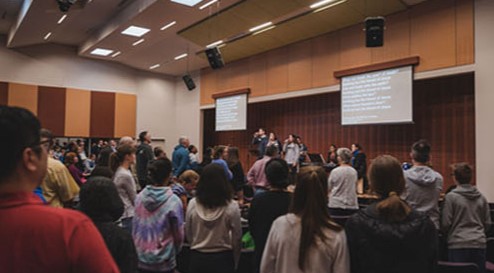AUDIO RECORDING

WRITTEN TRANSCRIPT
Friday Communication - 19th May 2023
Why the Nicene Creed?
Session received a good letter at its April meeting wondering whether we could return to using the Apostle’s Creed at the Lord’s Supper instead of the Nicene Creed. It was an encouraging letter to receive because what was motivating the enquiry was a concern for those outside the church. It was observed that the Nicene Creed was longer [it is, 227 words to the Apostle’s creed’s 110], contains less accessible vocabulary, the potentially offensive use of the word ‘men’ [‘for us men and for our salvation He came down from heaven’], and is what I would call conceptually denser, all of which could alienate those visiting by making the experience of church even more foreign than it was already.
There was a lot of sympathy in Session for the letter’s sentiments for a concern to be accessible and welcoming to those who are not yet Christians is something we want to characterise our gathering so that it is easy for people to come and hear the gospel. The outlook of the letter writers, thinking about those not yet Christian and their experience of church so that we can make it as good an experience as possible, is the outlook we want us all to cultivate.
An important consideration, not the only consideration
Nevertheless I, and the decision rests finally with the senior minister, I have decided to keep using the Nicene creed in our gatherings. Why? The simplest answer is that while making our gathering accessible to those not yet Christian is an important consideration, it is not the only consideration, and the continuing existence of those other considerations persuade me that it is still helpful to us to say the Nicene Creed eleven times a year at the Lord’s Supper.
What are those other considerations? In my mind there are three.
The need for theological richness
The need for historical consciousness
The need for conscious communal commitment to our common faith
The need for theological richness
Firstly, the need for theological richness. What makes the creed denser, more conceptually rich, is what makes it appealing. We live in an age where we are now, all of us, encountering very different conceptions of God in our community. It is not just Jehovah’s Witnesses with their denial of the deity of the Son, our Lord Jesus. We encounter Muslims who claim, in their denial of the Trinity, to have a truer revelation of God; Hindus who speak of a multiplicity of gods; and a resurgent animism in aboriginal spirituality. If we are not going to be confused and unsettled by this multiplicity of alternate understandings of God; if we are going to be able to share the gospel not just with secular Australians who give no thought to God but with those who have distinct convictions of the being of God, it is my conviction that every believer today needs to be a confident Trinitarian, to know the richness and beauty of confessing the One God in Three persons, Father, Son and Spirit, and to know why we make this confession. Here the Nicene Creed and its repetition at the Lord’s Supper helps us.
The creed helps us firstly with its richer presentation of the Son. This is where the bulk of the Creeds extra words are found, in declaring the Lord Jesus to be
“the only Son of God,
eternally begotten of the Father,
God from God, Light from Light,
true God from true God,
begotten not made,
of one Being with the Father.
Through him all things were made.
For us men and for our salvation
he came down from heaven:”
We are always tempted to have a too small a view of the Lord Jesus in a world that is determined to shrink Him to be just another prophet or teacher. The Creed reminds us that He is the eternal Son incarnate who shares the being of God. This is important for, for example, our conviction of the authority of His Word – that it is the word of the living God; for the completeness of His salvation, for only the incarnate Son can die a death that is ‘sufficient not for our sins but also for the sins of the whole world’, a death of infinite worth; for His authority to forgive sins, to give the forgiveness of God; and for our conviction that in Jesus’ death what we come to know is the love of the living God [Romans 5:5-8]. It is this confession of the Son that is at the heart of our confession of the one living God as Father, Son and Spirit, the only God, who is sufficient in Himself, who is love in Himself, who has life in Himself, far greater and qualitatively different than the idols of human imagining. To have the reality of the Son presented to us regularly will extend our thinking and strengthen our confidence in our Saviour.
Secondly the Creed helps us with its lines about the Spirit. This is the second major expansion beyond what is said in the Apostle’s Creed. The Spirit is at the heart of our present experience as believers in the Lord Jesus and it is good to have some understanding of His person and work in our minds. The confession reminds us that the Spirit is God, is the source of new life [John 3:1-15], that the Spirit is the way the Father and the Son come and make their home with us [John 14:15-24], and that the work of the Spirit is the continuing work of God in us, that it is God who saves us completely. It is also good, in an age where some who say they are Christians deny the authority of God’s Word, that it is the Spirit who has spoken the word through the prophets.
It is by what the Nicene Creed says about the Son and Spirit that we have a rich Trinitarian confession, a way of confessing what has been the reality of Christian experience from the beginning, that the God who saves us is Father, Son and Spirit, that to be a Christian is to come to the Father through the Son in the Spirit.
The need to develop an historical consciousness
Secondly, we need to develop an historical consciousness. As evangelicals we are good at the Bible, but not so good at learning and teaching church history. That can leave us feeling isolated, as if we have a faith that has not been tested in the experience of generations of faithful believers.
The creed connects us, even by language we find foreign, with believers across the sweep of the centuries and continents for from its inception it has been the genuinely ecumenical creed, confessed by all major branches of the Christian Church in all places.
That connection in turn reminds us that while we might think we are increasingly marginalized in our society and are being told a story of inevitable retreat before a triumphant secularism the Christian church has across the centuries experienced a waxing and waning of its societal influence but has endured, and even now in other parts of the world the church is flourishing.
It also reminds us that the church is neither the invention of nor dependent on the West, but the fruit of God’s purpose to save people from every nation and tongue [Rev. 5:9-10, Matt. 28:18-20].
So often in our competitive environment we focus on how we are different from other believers and churches, and there is need for clarity about that. But it is good also to see what we have in common with other Christians in all times and places, and to know the encouragement that we belong to the one, holy, catholic and apostolic church established by God, Father, Son and Spirit through His effective saving work.
The need for conscious communal commitment to our common faith
The third consideration is the need for conscious communal commitment to our common faith. It may seem a small thing, but the apostles’ creed starts “I believe”, the Nicene Creed starts “We believe.” The faith is not a solo pursuit. We are believers together, and what demarcates us from the world is our common confession. There was a time when people spoke of needing to have people ‘belong’ to a church community before they could believe. The Nicene Creed reminds us that it is believing in God as He has revealed Himself in Christ that creates the Church community, that what we have in common is a common faith, and not ethnicity, culture, social class, or even a desire to belong. This is helpful, for it keeps the gospel front and centre by reminding us that it is by preaching the gospel, through repentance and faith in the gospel of the glory of the Son, that people enter God’s church.
I am convinced that The need for theological richness, The need for historical consciousness, and The need for conscious communal commitment to our common faith are present, real and enduring needs, and the Creed helps in addressing them. Not on its own. It must be accompanied by teaching about its meaning, whether that is in profession of faith classes, bundylife, and from time to time on Sundays. But by its repetition it keeps the truth of the God revealed in the gospel before us, even as we celebrate in the Lord’s Supper our assured salvation by the death of the Son of God, our Lord Jesus.
That jarring phrase
What of that phrase that sounds so problematic in our culture –
For us men and for our salvation
he came down from heaven:
by the power of the Holy Spirit
he became incarnate from the Virgin Mary,
and was made man.
The Creed uses the plural masculine term ‘men’ as the inclusive term for all humanity, women and men. In this it was following the convention of the time and all understood it as inclusive. It is also the biblical convention rooted in our common descent from Adam, man.
It is not an easy phrase to translate in a way that preserves the truth that Jesus becomes one of us, human, by becoming a particular man, and that in His particular humanity can be as inclusive as Adam was of all who are His.
If we were to translate “for us humans …. He was made human’ you lose an emphasis on his particular humanity. He did not become a generic human, but a man. If you translate ‘for us people … he became a person’ you lose concrete embodiment in an abstraction.
If you were to translate “for us men and women …. He was made man’, you leave begging the question of how a particular man can include in Himself men and women.
It is not easy to preserve universal inclusion in a particular man without the prior inclusion of all in Adam, in man. The older language, while jarring to our ears, maintains this truth, and it maintains it in the context of focusing on the saving purpose of the incarnation – ‘for our salvation He came down from heaven’.
As it is no individual church or denomination has authority to change an ecumenical creed, the common property of all Christian churches, and this is the translation that has been used for centuries in English speaking churches.
The Creed becomes an opportunity to be reminded by an expression that seems out of place in our cultural moment that the faith did not originate from a 21st century western context, and is not its prisoner. It is an opportunity to perhaps see the world and humanity differently with an emphasis on our common humanity as descendants of Adam.
This Friday communication has gone too long already. I may not have persuaded you that these are more important considerations than the accessibility of all parts of our service to those not yet Christian but I do think the Nicene Creed addresses present needs and will in the end help our evangelism with its confident and clear Trinitarian confession focussing on the incarnation of the Son. I hope also that you will find encouragement in confessing together month by month the glorious truth of our saving God, Father, Son and Spirit, the One God, the true and living God for ever and ever.
RECENT POSTS





